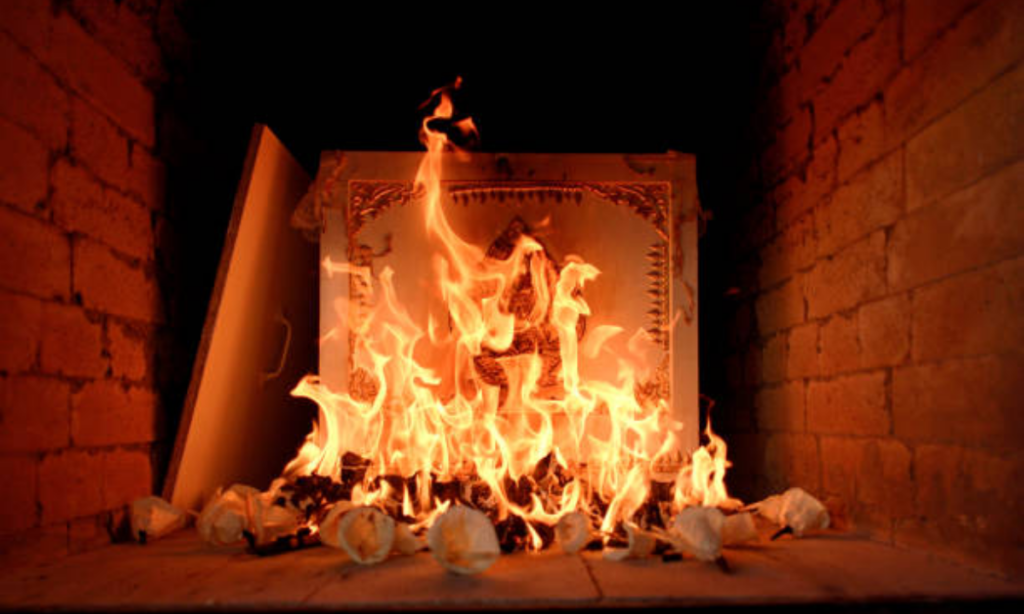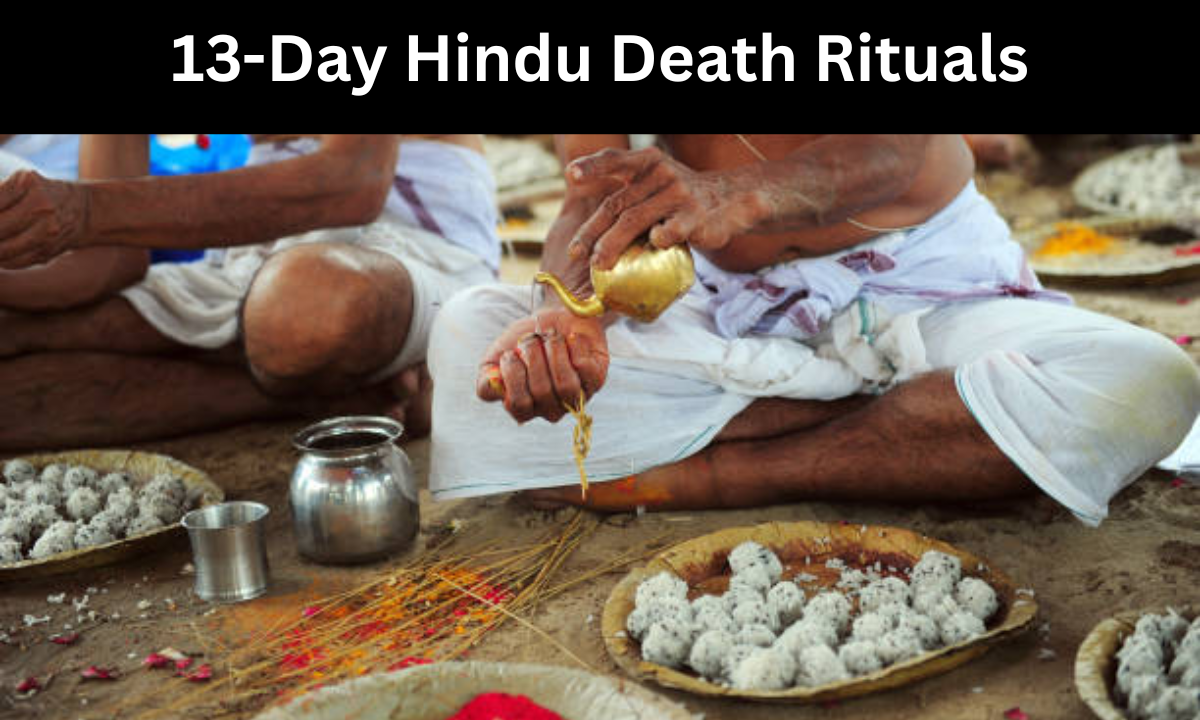The passing of loved ones within Hindu families requires spiritual and traditional practices that guide mourning rituals over thirteen days. These ceremonies named Hindu funeral rites 13 days serve three functions honouring the deceased person and bringing peace to their soul before providing rest to the family members. Through these rituals people seek two objectives: they want to guarantee proper soul transportation to the afterlife and they want to help the mourning family deal with their grief. The article explains this 13-day ritual sequence and also how Shradh, Tarpan, and Pind Daan ceremonies contribute to the process.
The Importance of Hindu Death Rituals
According to Hindu teachings about death the immortal soul begins its next cycle when someone passes away. The procedure of thirteen days provides a journey for departed souls to achieve peace while representing family members’ love through their expressions of respect for deceased memories. The community uses each ritual step to demonstrate their collective dedication for bringing comfort along with finality to their departed loved one.
Step-by-Step Guide to the Hindu Funeral Rites 13 days
1. Antyesti (The Last Rites and Cremation)

At the beginning of Hindu death rituals practitioners conduct Anstyesti which signifies “the last sacrifice.” The funeral process requires the deceased person to be burned. The deceased undergoes cleansing of the body while traditional clothing appears on them and they receive floral adornment. A religious official conducts spiritual prayers that are intended to help the deceased spirit find freedom. Family members typically perform this task by following the eldest son who lights the funeral flames of the deceased.
The modern funeral service providers of Bangalore enable metropolitan families to hold traditional rites through their traditional and contemporary cremation services. Religious customs state that funeral ashes from cremation should be obtained on day three for sacred water immersions into rivers like Ganges and other holy water bodies.
2. First Three Days: Mourning and Preparing for the Soul’s Journey
The first three days following a cremation hold special importance because the soul remains near its remains before advancing toward its spiritual path. The mourning phase requires observation from family members. The arriving relatives unite with prayerful support to help the soul reach its spiritual state.
During this period family members abstain from both meal preparation and musical activities as well as public celebrations. During this period people need to spend time with contemplation and perform rituals established by tradition.
3. Pind Daan (Offering Rice Balls for the Soul)
The most important ritual of Pind Daan takes place during the 13-day mourning period on the third day and subsequently on the seventh and eleventh days. The religious ritual requires one to present rice balls (pindas) combined with sesame seeds and water as an offering to the deceased soul.
Through Pind Daan people provide their departed souls spiritual nourishment which accompanies their spiritual journey. Modern practices enable the performance of this ritual using home services or by accessing local priest guidance in the Gaya or Varanasi region or at other designated locations. Residents of urban areas sometimes hire professionals who provide cremation services in Bangalore to help them perform their rituals.
4. Role of Tarpan (Water Offerings)
The Hindu funeral rites 13 days require the performance of Tarpan between the seventh and eleventh days. The practice includes mixing water with black sesame seeds, barley along with kusa grass which priests use to invoke blessings from ancestors for the departed soul’s peace.
The practice of Tarpan enables believers to show appreciation to their ancestors and maintain their spiritual connection with both living and passed individuals. Religious personnel conducts the ceremony near water sources which involves holy chants to purify sacrificial goods.
5. Shradh Ceremony (Final Ritual)
People organise the Shradh ceremony for the last day of their mourning observances. Brahmin priests together with prayers and food offerings participate in the substantial ritual. The principle function of Shradh involves searching for blessings to guide souls and achieves their transition from earthly existence to spiritual realms.
A family performs charitable work by making donations to poor individuals as well as by offering food and clothing items. During the Shradh rituals, the family conducts this act of generosity to demonstrate their goodwill and wish peace and blessings on the deceased soul in its afterlife.
Significance of Rituals in Modern Times
The thirteen-day Hindu death ceremonies maintain essential elements of spiritual and cultural traditions that persist throughout the contemporary fast lifestyle. The underlying purpose of these ceremonies carries no variations across regions since they function to assist both the soul and the bereaved family in finding a harmonious settlement.
People who reside in areas like Bangalore increasingly depend on cremation services in Bangalore to fulfill their death service requirements. The services connect traditional knowledge with modern organisations to provide smooth execution of religious ceremonies including Shradh and Tarpan and Pind Daan.
Common Questions About the 13-Day Rituals
1. Do Today’s Modern Life Priorities Allow for Ritual Alterations?
In Hindu tradition,s moral purity combined with spiritual commitment takes precedence above standard procedure requirements. People who cannot perform Pind Daan or Tarpan at their intended holy sites can get help from either local cremation services in Bangalore or priests offering services at convenient locations.
2. How Should Families Prepare for the 13-Day Rituals?
Families need to consult with a priest or elders to obtain information about the traditional customs that apply to their particular regional and community traditions. The arrangements for offerings and clothing along with donations must be carried out in a proper manner. The main objective rests in acknowledging the soul through genuine actions.
3. What Is the Role of Charity in Shradh?
Every aspect of Shradh depends upon charity. The family performs charity through donations of money or food or clothing to support the needy so that blessings can reach the deceased soul. The performing of charitable deeds in this period purifies a family’s karma while also providing spiritual richness for the deceased soul.
Emotional and Cultural Impact on Families
People may experience a range of challenges but also find peace through taking part in the Hindu funeral traditions during the 13 days. During this period of bereavement rituals serve as guides so family members can face acceptance and perform the necessary closure. The cultural customs exist to strengthen social connections and teach about spiritual traditions and help communities support one another.
Bangalore’s cremation services serve as major urban components that guarantee these rituals remain available to people despite the modern urban challenges. Such services provide grief-stricken families with priests and materials and spaces to perform death customs allowing traditional practices to remain intact.
Conclusion
English funeral customs during 13-day periods are both religious in meaning and essential to Hindu cultural traditions. The combination of Shradh, Tarpan, and Pind Daan sacred ceremonies allows souls to receive nourishment and peace as well as divine blessings during their spiritual transition. Through their rituals, grief families get closure as they remember their deceased family members before starting the process of healing themselves.
Bangalore residents rely on cremation services in Bangalore to help them perform these traditions because these services provide convenient access while preserving respect for the time-honored customs. The basic elements which make up these rituals encompass love and respect alongside optimistic hopes for everlasting peace for souls that have moved on.
Hindu traditional cremation services in Bangalore provided by Kaashimukthi allow families to carry out death rites while maintaining their dignity through their respectful cremation service offerings.

Madhu is an Entrepreneur, a Mentor, a Writer and an Aspiring Car Race Driver. He is Deeply passionate about leveraging Technology and Human Centred Design to make complex care and End of Life Planning easier. With the ultimate aim of Improving the quality of Life in the Twilight years. Madhu is highly educated and Alumni of IIM-Bangalore, Sikkim Manipal University and Bangalore University besides a Rich Industry Experience in the field of Product Management, Design, Supply chain, Finance, Commercial Management and Funeral Services.

